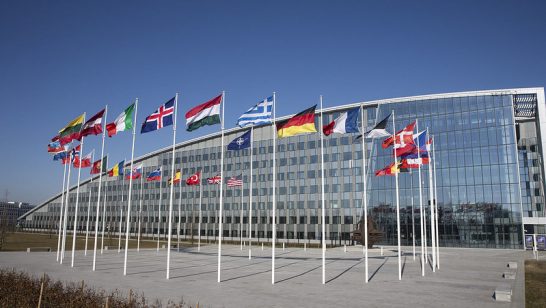
With the Ukraine crisis unfolding, relations between the West and Russia are plunging toward their lowest point since the end of the Cold War. In order to reassure its eastern allies, NATO has reinforced its presence in the Baltics and Poland. Moscow has recently conducted maneuvers involving Russian strategic bombers going on patrol over the Arctic Ocean. In the current political environment, U.S. President Barack Obama’s vision of a world free from nuclear weapons sounds like a far cry from a bygone era.
Preventing Fatal Miscalculations
Absorbed by the crisis at hand, few people think of arms control measures or their value. Indeed, such measures can hardly stop a crisis or prevent it from escalating. However, it is precisely in difficult times when arms control proves its significance.
Take the U.S.-Russian New START Treaty. That agreement caps the number of U.S. and Russian strategic nuclear forces and provides an important degree of transparency and predictability. The treaty’s data exchanges, notifications, and on-site inspections—all of which have continued in spite of the Ukraine crisis—assure each side that the strategic nuclear relationship remains bounded. That provides an important degree of stability. As relations between Washington and Moscow become more difficult, neither power, nor the rest of the world, has to worry about a strategic nuclear arms race.
Arms control thus helps to keep the situation from unintentionally degenerating from bad to worse. Arms control transparency also prevents overreactions caused when one side simply projects worst-case assumptions and misreads specific actions.
What if New START were not in place these days? The test launch of a Russian RS-12M Topol intercontinental ballistic missile on March 4 might not have been notified in advance. How would the U.S. and NATO defense and intelligence establishments, already under the stressof the current crisis, have interpreted the sudden launch? Might that launch have been misunderstood or perceived as a threat? The mutual predictability provided by arms control arrangements is particularly helpful in reducing military uncertainty and possible misinterpretation.
Existing arms control regimes are far from perfect. New START limits deployed strategic nuclear arms but leaves thousands of other nuclear weapons unconstrained. The conventional arms control regime in Europe restricting the quantity, deployment, and movement of heavy weapons has deteriorated over the past decade.
Still, the United States, Russia, and other European nations generally have not questioned their commitment to the implementation of the remaining bilateral and multilateral nuclear risk reduction and confidence-building arrangements, including New START and other agreements such as the OSCE’s Vienna Document on confidence- and security-building measures and the Open Skies Treaty. The latter two have shown their value in decreasing uncertainty about some military movements in the present crisis.
The measures available under these instruments were porous, sometimes obsolete, or did not work properly in the contemporary environment. They did not prevent the Ukraine crisis from escalating.
Guaranteeing Predictability
But these are not arguments against arms control. Rather, they are arguments in favor of revitalizing and strengthening arms control by tailoring it to contemporary challenges in order to bound military competition, increase predictability—particularly in the areas of existing or potential tension—and avoid unnecessary military build-ups or concentrations of forces that could be seen as provocative or misread. When the crisis around Ukraine is over, those measures could become indispensable to resuming trust-building in Europe and between the United States and Russia.
Current tensions certainly make arms control more difficult to pursue now. As in previous decades, arms control today requires a suitable political climate, including the absence of major crises, and a mutual interest in reducing common security risks and increasing stability.
However, we are not entering a new “Cold War” of global competition, proxy wars, and arms racing. But even in the darkest days of that era, arms control frameworks established stabilizing, verifiable limits on the most dangerous categories of weapons, put in place mechanisms for maintaining dialogue that helped to avoid the cataclysmic scenario of a superpower nuclear exchange, and sometimes generated momentum that led to a more positive overall relationship.
Why should it be less possible these days?
Editor’s note: A German-language version of this article was originally published in the Neue Zürcher Zeitung.
Ambassador Wolfgang Ischinger is Chairman of the Munich Security Conference. Steven Pifer is a senior fellow at the Brookings Institution and a former U.S. Ambassador to Ukraine. Andrei Zagorski is Head of Department for Arms Control and Conflict Resolution at the Institute of World Economy and International Relations of the Russian Academy of Sciences. All authors contributed to the report of the Deep Cuts Commission on “Options for Enhancing Euro-Atlantic and International Security”, coordinated by the Institute for Peace Research and Security Policy Hamburg.
The opinions articulated above represent the views of the author(s), and do not necessarily reflect the position of the European Leadership Network or any of its members. The ELN’s aim is to encourage debates that will help develop Europe’s capacity to address the pressing foreign, defence, and security challenges of our time.




